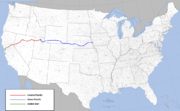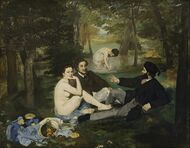Many thanks to our Patrons who cover ~2/3 of our hosting bill. Please join them if you can.
1863
Jump to navigation
Jump to search
1853 < 1854 < 1855 < 1856 < 1857 < 1858 < 1859 <1860 < 1861 < 1862 < 1863 > 1864 > 1865 > 1866 > 1867 > 1868 > 1869 > 1870 > 1871 > 1872 > 1873
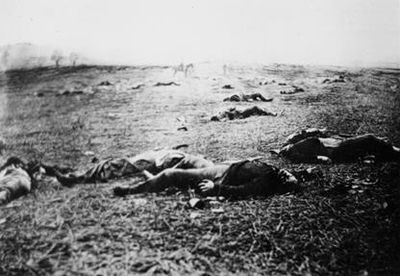 ‘'A Harvest of Death, Gettysburg - The Battle Of Gettysburg | |
| year 1863 |
Contents
Events
January–March
- January 1
- Abraham Lincoln signs the Emancipation Proclamation during the second year of the American Civil War, making the abolition of slavery in the Confederate states an official war goal. It proclaims the freedom of 3.1 million of the nation's four million slaves and immediately frees 50,000 of them, with the rest freed as Union armies advance.
- The first claim under the 1862 Homestead Act is made, for a farm in Nebraska.
- January 8
- Ground is broken in Sacramento, California, on the construction of the First Transcontinental Railroad in the United States.
- The Yorkshire County Cricket Club is founded at the Adelphi Hotel, in Sheffield, England.
- January 10 – The first section of the London Underground Railway (Paddington to Farringdon Street) opens officially.
- January 15 – French intervention in Mexico: French forces bombard Veracruz.
- January 21 – Adam Opel founds Opel AG.
- January 22 – The January Uprising breaks out in Poland, Lithuania and Belarus. The aim of the national movement is to liberate the Polish–Lithuanian–Ruthenian Commonwealth from Russian occupation.
- January 29 – American Indian Wars – Bear River Massacre: The United States Army, led by General Patrick Edward Connor, massacres Chief Bear Hunter and forces of the Shoshone, in the Idaho Territory.
- January 31 – Jules Verne's first adventure novel, Five Weeks in a Balloon (Cinq semaines en ballon), is published in Paris.
- February 1 – Radicals in Lithuania, Belarus, Latvia, northern Ukraine and western Russia join the January Uprising.
- February 16 – Kansas State Agricultural College is established, as the first land grant college created under the 1862 Morrill Act.
- February 17 – The "Committee of the Five" holds their first meeting in Geneva, Switzerland, which is regarded as the foundation of the International Committee of the Red Cross, following the lead of humanitarian businessman Henry Dunant.
- February 26 – Abraham Lincoln signs the National Banking Act into law.
- March 2 – The Clapham Junction railway station opens in London.
- March 3
- Idaho Territory is organized by the U.S. Congress.
- The U.S. National Conscription Act is signed, leading to the New York City draft riots in July.
- March 10 – Albert Edward, Prince of Wales (later Edward VII) marries Princess Alexandra of Denmark (later Queen Alexandra).
- March 14 – Queen Victoria issues Letters Patent granting Goulburn, New South Wales, city status, making it Australia's first inland city.
- March 19 – The SS Georgiana is destroyed on her maiden voyage, while attempting to run the blockade into Charleston, South Carolina. The wreck is discovered exactly 102 years later, by E. Lee Spence.
- March 30 – Prince Wilhelm George of Denmark, 17, is elected by the Hellenic Parliament as George, King of the Hellenes; he will reign in Greece for 50 years. He arrives in Athens on October 30 to take the throne.
April–June
- April 14 – The Treaty of Huế is signed between Vietnam and the French Empire.
- April 30 – Battle of Camarón in Mexico: 65 soldiers of the French Foreign Legion fight 2,000 Mexicans.
- May 1–4 – American Civil War – Battle of Chancellorsville: General Robert E. Lee defeats Union forces with 13,000 Confederate casualties, among them Stonewall Jackson (fatally wounded by friendly fire), and 17,500 Union casualties.
- May 8
- The Granadine Confederation becomes the United States of Colombia, under President Tomás Cipriano de Mosquera.
- January Uprising: The Polish insurgent army is defeated by the Russians near Gudiškis.
- May 14 – American Civil War – Battle of Jackson, Mississippi: Union General Ulysses S. Grant defeats Confederate General Joseph E. Johnston, opening the way for the Siege of Vicksburg.
- May 17
- After a 2-month siege, the French army of Bazaine takes Puebla, Mexico.
- The opening of Salon des Refusés in Paris draws attention to paintings by avant-garde artists, notably Manet's Le Déjeuner sur l’herbe.
- May 18 – American Civil War: The Siege of Vicksburg begins (ends July 4, when 30,189 Confederate men surrender).
- May 21
- The General Conference of Seventh-day Adventists is formed in Battle Creek, Michigan.
- May 23 – Ferdinand Lassalle founds the Allgemeiner Deutscher Arbeiterverein (General German Workers' Association, ADAV), the first socialist workers party in Germany.
- May 28 – American Civil War – The 54th Massachusetts, the first African-American regiment, leaves Boston to fight for the Union.
- May 31 – The first Prix de l'Arc de Triomphe horse race is held.
- June 7 – French intervention in Mexico: French forces enter Mexico City.
- June 9 – American Civil War: The Battle of Brandy Station, Virginia ends inconclusively.
- June 12 – The Arts Club is founded by Charles Dickens, Frederic Leighton and others in Hanover Square, London.
- June 13 – Samuel Butler's dystopian article "Darwin among the Machines" is published (under the pen name Cellarius) in The Press newspaper in Christchurch, New Zealand; it will be incorporated into his novel Erewhon (1872).
- June 14 – American Civil War – Second Battle of Winchester: A Union garrison is defeated by the Army of Northern Virginia, in the Shenandoah Valley town of Winchester, Virginia.
- June 17 – American Civil War: The Battle of Aldie in the Gettysburg Campaign ends inconclusively.
- June 20 – West Virginia is admitted as the 35th U.S. state.
July–September
- July 1 – Slavery is abolished in the Dutch colonies of Suriname (independent from 1975) and Curaçao and Dependencies.
- July 1 – The Kingston loop line of the London and South Western Railway opens.
- July 1–3 – American Civil War: Battle of Gettysburg – Union forces under George G. Meade turn back a Confederate invasion by Robert E. Lee in the largest battle of the war (28,000 Confederate casualties, 23,000 Union).
- July 4 – American Civil War: Siege of Vicksburg – Ulysses S. Grant and the Union army capture the Confederate city Vicksburg, Mississippi, after the town surrenders, following a 47-day siege.
- July 6 – Queen Victoria issues Letters Patent, annexing to South Australia the part of the colony of New South Wales that will later become the Northern Territory.
- July 9 – American Civil War: The Siege of Port Hudson ends, and the Union controls the entire Mississippi River for the first time.
- July 13 – American Civil War – New York City draft riots: In New York City, opponents of conscription begin 3 days of violent rioting, which will be regarded as the worst in the history of the United States with around 120 killed.
- July 16 – Battle of Shimonoseki Straits: The screw sloop USS Wyoming engages with the Chōshū Domain fleet before withdrawing, in Japan's first naval engagement between elements of modern navies.
- July 17 – The New Zealand Wars against the Māori people resume, as British forces in New Zealand led by Duncan Cameron begin their Invasion of the Waikato.
- July 30 – American Indian Wars: Representatives of the United States and tribal leaders including Chief Pocatello (of the Shoshone) sign the Treaty of Box Elder.
- August 8 – American Civil War: Following his defeat in the Battle of Gettysburg, General Robert E. Lee sends a letter of resignation to Confederate President Jefferson Davis (Davis refuses the request upon receipt).
- August 15–17 – Bombardment of Kagoshima: The British Royal Navy bombards the town of Kagoshima in Japan in retribution, after the Namamugi Incident of 1862.
- August 16 – After Spain's annexation of the Dominican Republic, rebels raise the Dominican flag in Santiago to begin the Dominican Restoration War.
- August 17 – American Civil War: In Charleston, South Carolina, Union batteries and ships bombard Confederate-held Fort Sumter (the bombardment does not end until December 31).
- September – The Western Railroad from Fayetteville, North Carolina to the coal fields of Egypt, North Carolina is completed.[1]
- September 6 – American Civil War: Confederates evacuate Battery Wagner and Morris Island, in South Carolina.
October–December
- October 3 – U.S. President Abraham Lincoln proclaims a national Thanksgiving Day, to be celebrated on the final Thursday in November.
- October 5 – The Brooklyn, Bath and Coney Island Rail Road starts operations in Brooklyn, New York; this is now the oldest right-of-way on the New York City Subway, the largest rapid transit system in the United States, and one of the largest in the world.
- October 23 – Ffestiniog Railway in North Wales introduces steam locomotives into general service, the first time this has been done anywhere in the world on a public railway of such a narrow gauge (2 feet (61 cm)).
- October 26 – The Football Association is formed in London.
- October 26–29 – The Resolutions of the Geneva International Conference are signed by sixteen countries meeting in Geneva agreeing to form the International Red Cross.
- November 15 – The death of King Frederick VII of Denmark, and the succession of his distant cousin Christian IX, marks the beginning of the Second Schleswig-Holstein crisis.
- November 18 – King Christian IX of Denmark signs the November Constitution, which declares Schleswig to be part of Denmark, regarded by the German Confederation as a violation of the London Protocol of 1852, leading to the German–Danish war of 1864.
- November 19 – American Civil War: U. S. President Abraham Lincoln delivers the Gettysburg Address, at the military cemetery dedication ceremony in Gettysburg, Pennsylvania.
- December 15
- Romania opens its first mountain railway (from Anina to Oravița).
- Gerard Adriaan Heineken, 22, buys the brewery 'De Hooiberg' ("The Haystack") in Amsterdam.
- December 19
- Linoleum is patented in the United Kingdom.
- Association football is played for the first time in the modern era.
Date unknown
- The Second Anglo-Ashanti war begins.
- Bartolomé Mitre secretly backs the revolt of Venancio Flores, against the Uruguayan Blanco government.
- The Chōshū Five leave Japan secretly to study at University College London, which is part of the ending of sakoku.
- The first outbreak of phylloxera on the European mainland is observed, in the vineyards of the southern Rhône region of France.
Events
| Event | Start | End | Description |
|---|---|---|---|
| Pax Brittanica | 1815 | 1915 | |
| Victorian era | 1840 | 1901 | |
| American Civil War | 1861 | 1865 | The Start of US World dominations, the Civil war saw capitalists fight capitalists in a war over tax, slavery and the question how big and kind of an imperial force the US should become on the North American continent. |
New Groups
| Group | Image | Type | Description |
|---|---|---|---|
| Red Cross |  | NGO Non-profit | |
| Boğaziçi University |  | Public | Turkish elite university with strong ties to the American educational system. |
| Adelaide Club | 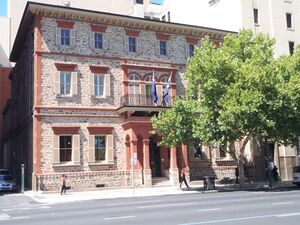 | Exclusive Adelaide club for members of the Adelaide Establishment. | |
| Robert College | 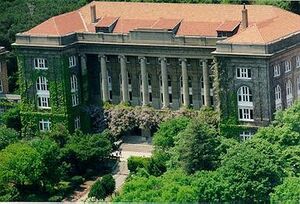 | A long established school with many Turkish Bilderbergers among its alumni. | |
| Boston College | 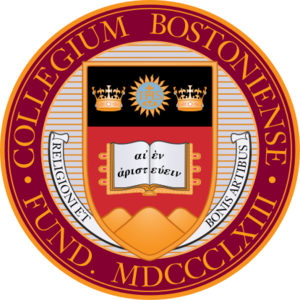 | Private NonprofitResearch Coeducational | Jesuit Catholic university.At the city, state and federal levels, BC graduates dominated Massachusetts politics for much of the 20th century. |
| La Salle University | 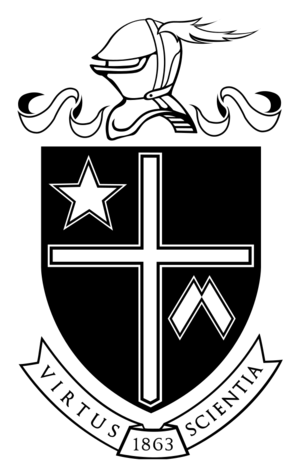 | Military ranks Catholic | Catholic university in Philadelphia, Pennsylvania |
| Polytechnic University of Milan |  | Intended to do all graduate courses in English, but stopped by courts. | |
| University of Jyväskylä |  | The university offers a wide range of study programmes for master's degree conducted in English, many of which are unique in Finland. | |
| Office of the Comptroller of the Currency | 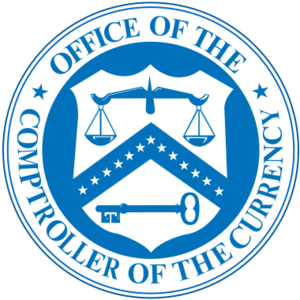 | Bureau within the United States Department of the Treasury that charters, regulates, and supervises all national banks - and is captured by the banksters. | |
| Social Democratic Party of Germany |  | ||
| Kansas State University | 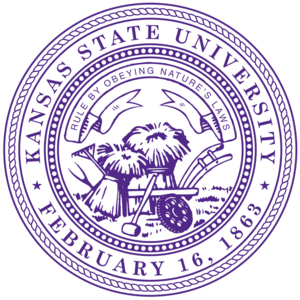 | University Nation state Public Flagship Land-grant Space Grant | Significant agrodefense and biodefense research |
| Book and Snake |  | Secret society | A secret society of interest. |
| Adelphi University |  | Military ranks | Small university in New York |
| Social Democratic Party of Austria |  | Austrian social-democratic political party. |
Births
| Title | Born | Place of birth | Died | Summary | Description |
|---|---|---|---|---|---|
| Gates McGarrah | 1863 | 1940 | |||
| David Lloyd George | 17 January 1863 | Lancashire Chorlton-on-Medlock UK | 26 March 1945 | Politician Lawyer | UK PM 1916-1922 |
| William Randolph Hearst | 29 April 1863 | San Francisco | 14 August 1951 | Media mogul Businessperson Publisher | US media mogul |
| Henry Ford | 30 July 1863 | US Michigan Greenfield Township | 7 April 1947 | Businessperson | |
| Frederic Adrian Delano | 10 September 1863 | New York US Manhattan | 28 March 1953 | Businessperson | First vice-chairman of the US Federal Reserve |
| Esmé Howard | 15 September 1863 | 1 August 1939 | Diplomat Deep state actor | An integral member of the small group of men who made and implemented British foreign policy (the Milner group?) | |
| Samuel Bush | 4 October 1863 | US New Jersey Essex County | 8 February 1948 | Businessperson | Bush family patriarch, from a wealthy background, who got into railroads and then finance. |
| Franz Ferdinand | 18 December 1863 | 28 June 1914 | Politician | The archduke whose assassination is widely cited as the proximate cause of World War I. |
Many thanks to our Patrons who cover ~2/3 of our hosting bill. Please join them if you can.
References
- ↑ CommunicationSolutions/ISI, "Railroad — Western Railroad Company", North Carolina Business History, 2006, accessed 1 Feb 2010
